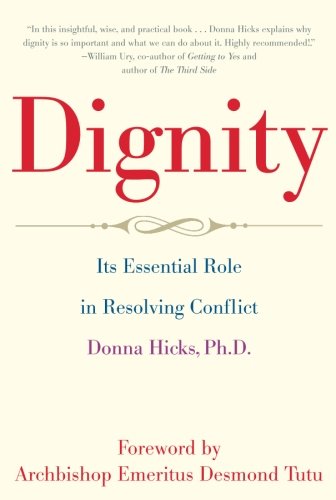Dignity: Its Essential Role in Resolving Conflict by Donna Hicks
Book Review by Debra Vey Voda-Hamilton
Dignity will be a welcome addition to the Center for Understanding in Conflict professionals’ library.
Author Donna Hicks explores what dignity is, how we assimilate dignity both personally and with our clients, while bringing dignity practices into our meetings. This book memorializes her experiences facilitating discussions between IRA prisoners and British law enforcement and their families in the documentary, Facing the Truth. Archbishop Desmond Tutu, Leslie Bilinda and Ms. Hicks were facilitators in this groundbreaking discussion.
Hicks created three models for understanding and applying dignity to the practice of conflict resolution. She lists 10 Essential Elements of Dignity, 10 Temptations to Violate Dignity and finally How to Heal Relationships with Dignity.
10 Essential Elements of Dignity are briefly as follows:
Assuming others have integrity
this helps us express our authentic self without the fear of negative judgements by or about others.
Inclusion
making sure you feel and others feel that they really belong.
Safety
participants are in a place where they feel physically and psychologically safe; no fear of bodily harm or humiliation.
Acknowledgement
giving others your full attention, “by listening, hearing validating and responding to their concerns, feelings and experiences.” Recognition- validate others for their talents, hard work, thoughtfulness and help. Generously praise, show appreciation and gratitude for contributions and ideas.
Fairness
treat people justly, in an even handed way according to agree upon laws and rules.
Benefit of the doubt
treat people as trustworthy. Start with the premise that others have good motives and are acting with integrity.
Understanding
believe that what others think matters. Give them the chance to explain and express their point of view while actively listen with no judgement.
Independence
encourage people to act on their own behalf so they feel in control of their lives and experiences, fostering a sense of hope and possibility.
Accountability
Take responsibility for your actions. If you have violated the dignity of another person, apologize and make a commitment to change your hurtful behaviors.
10 Temptations to Violate Dignity:
Taking the bait.
Don’t let the bad behavior of others determine your own. Restraint is the better part of dignity, just don’t take the bait.
Save face-.
Don’t lie, cover up or deceive yourself. Tell the truth about what you’ve done,
Shirking responsibility
When you have violated the dignity of another, acknowledge it, admit you make a mistake and apologize.
Seeking false dignity
If we depend on others for validation of our worth, we are seeking false dignity. Authentic dignity resides within us.
Seeking false security
If we remain in a relationship in which our dignity is routinely violated, our desire for connection has outweighed our need to maintain our own dignity.
Avoiding conflict
when your dignity is violated take action. A violation is a signal that something in a relationship needs to change, stand up for yourself and don’t avoid confrontation.
Being a victim
don’t assume you are the innocent victim in a troubled relationship. Open yourself up to the idea that you might be contributing the problem.
Resisting feedback
We often don’t know what we don’t know. We all have blind spots. We need to overcome our self-protective instincts and accept constructive criticism. Feedback gives us an important opportunity to grow.
Blaming and shaming others to deflect your own guilt
Control the urge to defend yourself by making others look bad.
Engaging in false intimacy and demeaning gossip
beware of the tendency to connect by gossip about others in a demeaning way. Being critical and judgmental about others when they are not present is harmful and undignified. If you want to create intimacy with another speak the truth about yourself, about what is happening in your inner world and invite the other person to do the same.
Finally;
How to Heal Relationships with Dignity
Listen without interrupting or challenging.
Listen to seek understanding. We more commonly listen to our adversaries to one up them and attack.
Acknowledge and recognize what the other has been through.
As I say in my lectures, this does not mean you agree with their point of view. It simply reflects your belief that their point of view is worthy of acknowledgement and recognition. Hicks believes, “Sharing our experiences with expression may help the person we’ve injured in the heat of a conflict feel less defensive or justified.”
Honor and acknowledge each other’s integrity,
thereby creating a mutual bond.
All participants must honor each other’s dignity and agree that sitting down together is worthy of your time and attention. Hick’s believes this is the step that makes all the difference. She notes, “It is much more common to withdraw from those whom we have been in conflict with and refuse to talk to them.”
The process explained in this book reflects conditions that appear to contribute to positive outcomes when facing the truth is enabled and on point with the Center for Understandings teachings. I hope you’ll enjoy it.
